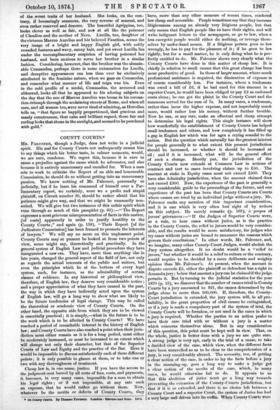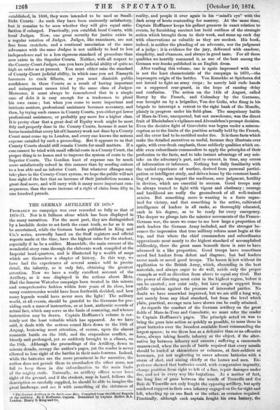COUNTY COURTS.*
MR. FALCONER, though a Judge, does not write in a judicial spirit. His zeal for County Courts not unfrequently causes him to say things which his better taste, in calmer moments, would, we are sure, condemn. We regret this, because it is sure to cause a prejudice against the cause which he advocates, and also because it is entirely unnecessary and uncalled for. When a man sets to work to criticise the Report of an able and honourable Commission, he should do so without getting into an unnecessary passion. We know nothing of Mr. Falconer, personally or judicially, but if he loses his command of himself over a Par- liamentary report, we certainly, were we a prolix and stupid plaintiff, on Circuit number 30, should be rather afraid that his patience might give way, and that we might be summarily non- suited. We will give but two instances of this unfair spirit which runs through so much of this pamphlet (p. 60) :—" The Report expresses a most grievous misrepresentation of facts in this matter, [of costs] apparently in order to justify hostility to the County Courts ;" and again (p. 138), "Their Report [of the Judicature Commission] has been framed to promote the interests of lawyers." We will say no more on this unpleasant point. County Courts may at present be looked at from two points of view, some might say, theoretically and practically. In the general system of English Law and judicial procedure they have inaugurated a new era. They have, more than anything else in late years, changed the general aspect of the field of law, not only as regards the actual interests of the public and suitors, but even the principles which lie at the bottom of every legal system, such, for instance, as the admissibility of certain classes of evidence. In any historical or philosophical view, therefore, of English law, they deserve very considerable notice ; and a proper appreciation of what they have caused in the past, the way in which they have indirectly acted upon the system of English law, will go a long way to show what are likely to be the future tendencies of legal change. This may be called the theoretical or academic view of County Courts. On the other hand, the opposite side from which they are to be viewed is essentially practical ; it is simply,—what in the future is to be the work which is to be allotted to County Courts? We have reached a period of remarkable interest in the history of English law; and County Courts have also reached a point when their juris- diction must either remain as it is for a long period, must either be moderately'increased, or must be increased to an extent which will change not only their character, but that of the Superior Courts of Law and Equity and the practice of the Bar. Here it would be impossible to discuss satisfactorily each of these different points ; it is only possible to glance at them, or to take one or two with any thoroughness of treatment.
Cheap law is, in one sense, justice. If you have the access to the judgment-seat barred by all sorts of fees, costs, and payments, it becomes, in very many cases, impossible for a man to obtain his legal rights ; or if not impossible, at any rate such an expense, that he would rather go without them. Now, whatever be the merits or defects of County Courts, they
• OPI CsseJy Caati. By Thomas Falconer. London : Stevens and Sons. 1874. have, more than any other measure of recent times, rendered law cheap and accessible. People sometimes say that they increase litigiousness among an already very litigious people, but that only means that English people like to have their rights, and will write indignant letters to the newspapers, or go to law, when a less energetic people would either do nothing, or revenge them- selves by under-hand means. If a litigious person goes to law wrongly, he has to pay for the pleasure of it ; if he goes to law rightly, but for a small matter, he is only doing what he is per- fectly entitled to do. Mr. Falconer shows very clearly what the County Courts have done in this matter of cheap law. It is chiefly in relation to small causes that this great change has been most productive of good. In those of larger amount, where much professional assistance is required, the diminution of expense is of course considerably less. For instance, where a tradesman was owed a bill of £6, if he had sued for this amount in a superior Court, he would have been obliged to pay £2 as endorsed costs alone ; he can get the plaint in the County Court and the summons served for the sum of 7s. In many cases, a tradesman, rather than incur the higher expense, and not improbably much more, would rather lose his money, without further trouble. Now he can, at any rate, make an effectual and cheap attempt to determine his legal rights. This single instance will show how wonderfully the establishment of County Courts has helped small tradesmen and others, and how completely it has filled up a gap in English law which was for ages a crying scandal to the nation. But the questien which naturally has the greatest interest for people generally is to what extent this present jurisdiction should be increased, or whether it should be increased at all ; and if it is increased, what will be the general effect of such a change. Shortly put, the jurisdiction of the County Courts now extends at Common Law in actions of contract and tort to cases involving claims up to 150. The amount at stake in Equity cases must not exceed £500. They have also Admiralty jurisdiction, when the amount claimed does not exceed £300. Now, the experience of the past is generally a very considerable guide to the proceedings of the future, and one experience of the past has been that County Courts are Courts where causes are tried by an individual judge without a jury. Mr. Falconer omits any mention of this important consideration, and it is one which is very often lost sight of by writers on this subject. He merely remarks (p. 169), a propos of jurors' grievances:—" If the Judges of Superior Courts were, as a rule, to hear cases without juries, as is the practice in the County Courts, the relief to jurors would be very consider- able, and the results would be more satisfactory, for judges who try cases without juries are bound to announce the reasons which govern their conclusions." In other words, Mr. Falconer, and, we imagine, many other County-Court Judges, would abolish the Jury system altogether. It no doubt would be a "relief to jurors," but whether it would be a relief to suitors or the contrary, would require to be decided by a more deliberate and weighty opinion than Mr. Falconer's. At present, when the amount in dispute exceeds 15, either the plaintiff or defendant has a right to demands jury; below that amount a jury can be claimed if the judge permits it. But by turning to the judicial statistics for the year 1870 (p. 15), we discover that the number of causes tried in County Courts by a jury amounted to 921, the causes determined by the judge alone to more than 500,000. If, therefore, the County- Court jurisdiction is extended, the jury system will, in all pro- bability, in the great proportion of civil causes be extinguished, or if a jury is made a compulsory part of the system of trial, the County Courts will be forsaken, or not used in the cases in which a jury is required. Whether the parties to an action prefer to have their case tried with or without a jury is a matter which concerns themselves alone. But in any consideration of this question, this point must be kept well in view. That, on the whole, justice is better done with a jury we are quite sure. A strong judge is -very apt, early in the trial of a cause, to take a decided view of the case, which view, when the different facts have been unravelled so as to be clear to the comprehension of a jury, is very considerably altered. The necessity, too, of getting a clear notion of the case, in order to lay the facts before a jury in the summing-up, goes a long way to make a judge get a clear notion of the merits of the ease, which, in many cases, he would otherwise fail to do. It appears to us that this abolition of juries must go a long way towards preventing the extension of the County-Courts jurisdiction, but that if it is so extended, and there is no choice left between a County Court and a superior Court, the system of Juries has had a very large nail driven into its coffin. When County Courts were established, in 1846, they were intended to be used as Small- Debt Courts. As such they have been eminently satisfactory, but it remains to be seen whether they will give equal satis- faction if enlarged. Practically, you establish local Courts, with local Judges. Now, one great security for justice exists in a regular rotation of Judges. Judges, like examiners, are not free from crotchets, and a continual association of the same advocates with the same Judges is not unlikely to lead to less independence and to a less rigorous standard of procedure than now exists in the Superior Courts. Neither, with all respect to the County-Court Judges, can you have judicial ability of quite so high an order as at present. You must either raise the standard of County-Court judicial ability, in which case you set Nasmyth hammers to crack filberts, or you must diminish public confidence in these Courts as a result of having important and unimportant causes tried by the same class of Judges. Moreover, it must always be remembered that in a simple case of debt it is easy enough for a tradesman to plead his own cause ; but when you come to more important and intricate matters, professional assistance becomes necessary, and then, by trying such causes in County Courts, you either get lower professional assistance, or probably pay more for a higher class. It is pretty clear that a great deal of Equity work might be most fitly and properly done in the County Courts, because it must be borne inmind that every bit of Chancery work not done by a County Court must come up to London, and every one knows the serious expense entailed by such a proceeding. But it appears to us that County Courts should still remain Courts for small matters. If a case cannot be tried with small official costs in a County Court, the proper thing is to lessen and to improve the system of costs in the Superior Courts. The Gordian knot of expense can be much more satisfactorily solved in this manner than by sending suitors to a less able and an inferior Court. But whatever changes may take place in the County-Court system, we hope the public will not lose sight of the fact that an increase of their jurisdiction means a great deal more, and will carry with it many more important con- sequences, than the mere increase of a right of claim from fifty to one hundred pounds.







































 Previous page
Previous page